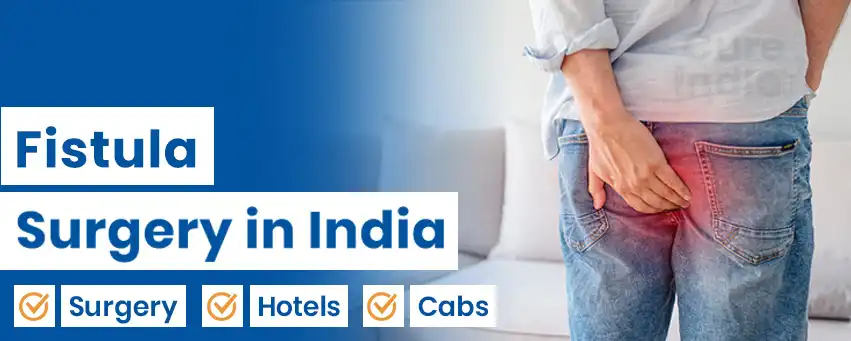

The formation of an abnormal connection or passageway between the two parts of the body (organs, blood vessels, etc.), as a result of surgery or an injury is known as the Fistula. It can also form after an inflammation that is caused by infection. The most common type of fistula is the anal fistula, also known as fistula in ano. There is no specific cause of fistula. However, it has been noted that the majority of fistula is associated with inflammatory conditions like Crohn’s Disease, and the solution for it is fistula treatment. About 25% of Crohn’s disease patients will develop a fistula. Crohn's disease is a condition caused by inflammation in the Gastrointestinal Tract (Digestive track). The infection in the different areas of the GI tract can extend to the deeper layers of the intestine.
There are four types of Fistulas:
India is constantly upgrading in the field of healthcare. The doctors are well-trained with hands-on training and good knowledge about the diagnosis of fistula treatment and other medical conditions. Many people from different countries are travelling to India for medical treatment due to the affordable service without any waiting period. For instance, many African patients prefer CureIndia for treatment assistance available in major cities like Delhi, Mumbai, Hyderabad, Bangalore, and Kochi. Medical tourism in India not only provides you with safe and quality care at the hands of highly experienced fistula surgeons in India but also allows you to save money. Besides this, the patient can enjoy a diversity of the cultural heritage in India. Therefore, people can enjoy a stress-free and comfortable medical journey to India.
The most common type of fistula is the perianal fistula. However, depending upon where the fistula is formed, the different types of fistula are as follows:
■ Anal Fistula: It is the formation of the unusual passageway from the anus to the outside skin. It is caused by a perianal abscess (a pus-filled, painful bump near the anus) as a result of infection in the glands near the anus. Some diseases such as Crohn’s disease increases the chances of fistulas near the anus.
The symptoms include:
■ Arteriovenous Fistula: The unusual connection between an artery and a vein is known as an arteriovenous fistula. The most common cause of this type of fistula is injury. Sometimes the arteriovenous fistula is helpful, the surgeons create such fistulas to help patients with kidney failure and need dialysis.
The symptoms of Arteriovenous Fistula are:
■ Aortoenteric fistula: The abnormal connection between the aorta and the small intestine is known as aortoenteric fistula. It is life-threatening and can lead to bleeding in the digestive tract. There are 2 types of aortoenteric fistulas: The primary fistula which is caused by aortic aneurysm. And secondary fistula is caused by the aorta surgery.
The symptoms of Aortoenteric Fistula are:
■ Perilymphatic fistula: The formation of a hole/tear in the membrane separating the inner ear and middle ear is known as perilymphatic fistula. As a result of this fistula, the fluid flows from the inner ear to the middle ear. This affects balance and hearing. Some people recover with bed rest while some need surgery to resolve the condition.
The symptoms of Perilymphatic Fistula are:
■ Tracheoesophageal fistula (TEF): The unusual connection between the trachea and esophagus is known as tracheoesophageal fistula. It is a congenital condition. However, some adults develop this condition from other medical conditions such as cancer.
The symptoms of Tracheoesophageal Fistula are:
■ Vaginal Fistula: It is the term used for unusual openings forming in the wall of the vagina. The connection may form with the organs that lie near the vagina such as the urinary bladder, uterus, small intestine, large intestine, etc. The unusual connection between the vagina and urinary bladder is known as Vesicovaginal Fistula and the unusual connection between vagina and rectum is known as Rectovaginal Fistula. The vaginal fistula in women that forms due to complications of childbirth is known as Obstetric Fistula.
The symptoms include:
Although the specific cause of fistula is uncertain, the common causes of fistula disease are injury and surgery. A fistula can be caused by the aftereffects of a major surgery or it may be caused by an infection that has occurred due to injury. Because the fistula of ano is the most common form of fistula that is seen in people, the causes of the same are listed below:

There are various small glands near the anus. The infection in these glands results in inflammation and pus formation which is a painful condition known as anal abscess. If left untreated, it can lead to serious medical conditions.
The inflammation in the intestine is known as inflammatory bowel disease (IBD) which is a term used for other diseases like crohn’s disease and ulcerative colitis. The infection in the digestive tract leads to inflammation in the intestine.
The anal fistula may be caused by anorectal cancer. Due to the aberrant cell proliferation, the tumors are formed. These tumors form the fistula in the anus, typically connected to the rectum where the feces are stored after the digestion is completed.
Perianal Fistula is a possible side effect of several sexually transmitted diseases. Both HIV / AIDS are the result of viral infections that impair immune function. An anal abscess or a fistula in ano may occur due to this greater vulnerability to infection.
The lungs are the most common location for tuberculosis to manifest inside the body; however, the disease may manifest in any part of the body. It can have an effect on the rectum, leading to an anal abscess, which then travels to the surface, resulting in a perianal fistula.
There are several methods of diagnosing a fistula. It depends on what type of fistula you might have. Based on the estimation done by a doctor, different fistula diagnosis tests are used. However, the anal fistula is the most common. Hence, the diagnostic methods for anal and perianal fistulas are as follows:
The type of procedure for fistula treatment in India depends on the fistula’s location, cause, and complexity. The anal fistula treatment is done to repair the fistula and to prevent it from recurring while protecting the sphincter muscles. Although perianal fistula surgery is required, some less invasive procedures are also available:

■ Fistulotomy: It is a procedure where the surgeon cuts the internal opening of a fistula, removes the infected tissue, flattens the fistula, and stitches it in place. If the fistula is complicated, the surgeon may remove the entire or part of the fistula.
■ Endorectal advancement flap: It is also known as rectal fistula surgery. The surgeon creates flaps from the walls of the rectum and then removes the internal opening of the fistula. The flaps are then used to cover the repaired area.
■ LIFT (Ligation of the intersphincteric fistula tract): This treatment option is used for complex fistulas. The surgeon first places a seton (latex string) to make the fistula tunnel-wide. Then after a few weeks, the surgeon removes the infected part and closes the opening of the fistula.
■ Medication: If the fistula is caused by Crohn’s disease, then the medicines are used for the treatment of the fistula.
■ Seton placement: The surgeon places a latex or silk string into the tunnel so that the infection is drained out. As the infection is removed, it initiates the healing process. This procedure is sometimes used in combination with surgery.
■ Fibrin glue and collagen plug: The surgeon clears the fistula passageway and closes the internal opening with stitches. Then, the surgeon injects either glue (made from fibrin protein) or a plug (made from collagen protein) through the external opening of a fistula.
■ Ostomy and Stoma: In this procedure for fistula treatment in India, the surgeon makes an opening in the abdomen to divert the intestine from the anus temporarily. The bag is placed on the abdomen in which the excrement is collected. By doing so, the area around the anus and surrounding part gets enough time to complete the healing process.
■ Muscle flap: It is a surgical procedure in which after clearing the tunnels created by fistulas, the healthy muscle tissues are taken from the thigh, buttocks, or labia and filled into the tunnel.

Dr. Vicky Kuldeep is one of the expert general surgeons with vast experience. He is efficient in general, Laser, and laparoscopic surgeries.

Dr. Sumeet Shah is one of the most experienced general surgeons in India. He performs general, laparoscopic, bariatric, and robotic surgeries.

Dr. Vinay Kumar Shaw is a specialist surgeon for fistula. His other surgery specializations are gallbladder stone, hernia, bariatric, laser piles, laparoscopic, and GI surgery.


Dr. Nikhil Narain is the best general surgeon and proctologist in Delhi, India. He performs piles, fissures, fistulas, varicose veins, etc. surgery successfully.

The total fistula treatment cost in India depends on how complex it is and the required treatment, including charges of your surgeon, medications, and hospital fees. It is different everywhere. However, the average cost of fistula treatment in India ranges from $1,500 to $2,000 which is much cheaper than in Western countries like the USA where this procedure costs araound $5,000 to $7,500 and in Thailand from the range of $3,000 to $4,000.
| Treatment | Cost in India | Stay in India |
|---|---|---|
| Anal Fistula Treatment in India | $2,000 | 7 Days |
The recovery time from fistula treatment in India depends on the type of treatment you have received, the overall health of a patient, the skill of a surgeon, etc. The patient will have little bleeding and pain for around 1 to 2 weeks post-surgery. Your surgeon will recommend you eat more fiber-rich food for good digestion and bowel movements. Also, he will prescribe you laxatives to ease the cleaning of the digestive tract. Your surgeon will also prescribe a cream to apply on the incision site which can give you relief from irritation and avoid further infection. The use of any other products such as talcum powder should be strictly avoided. Take proper rest at home and avoid sitting or walking for long periods. It will take about 6 weeks for complete recovery. Follow the guidelines given by your doctor for stress-free recovery and stay calm.
Your surgeon will discuss everything with you from what your condition is to how it will be treated, best treatment options, recovery time, etc. The recovery from this surgery is simple, you just need to rest for a few days and avoid any intense exercise. By following the guidelines given by your surgeon, you will be completely healed within a short period. In India, hospitals for fistula treatment are well equipped with the latest technology to provide premium treatment to their patients. The total cost of fistula treatment in India is also much more affordable than in other countries. The top hospitals in India facilitate personalized care, separate rooms, food, and quality treatment. Also, India has charming destinations and natural beauty to view and enjoy. If you are thinking about getting your treatment done, you can consider India without any hesitation.
